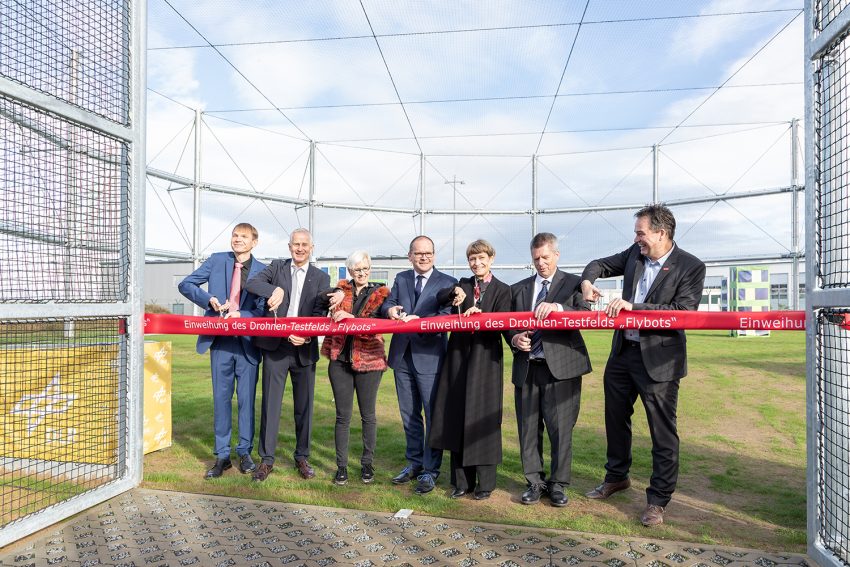Unique drone test field inaugurated in Braunschweig Joint project between TU Braunschweig and DLR researches unmanned aerial vehicles
The new FLYBOTS drone test field was officially inaugurated on 21 October 2025. This joint project between TU Braunschweig and the German Aerospace Center (DLR) has created unique research infrastructure in Germany for the study and testing of unmanned aerial vehicles (UAVs). The grand opening was attended by DLR representatives, as well as Grant Hendrik Tonne, Lower Saxony’s Minister for Economic Affairs, Transport and Construction, and TU President Angela Ittel.

TU President Prof. Dr. Angela Ittel (third from right) is pictured here with Lower Saxony’s Minister for Economic Affairs, Transport and Construction, Grant Hendrik Tonne (centre), and DLR Chair Prof. Dr.-Ing. Anke Kaysser-Pyzalla (third from left), as they cut the ribbon to open the “FLYBOTS” drone test field. Photo credit: Kristina Rottig/TU Braunschweig.
FLYBOTS is a unique composite test field consisting of three complementary test environments:
- an electromagnetically shielded wind tunnel at TU Braunschweig,
- a drone cage for safe flight tests at DLR
- and a mobile infrastructure for drone detection, also at DLR.
This combination enables drones and their propulsion systems to be examined holistically under realistic and controlled conditions. The aim is to significantly improve the safety, efficiency and reliability of future UAV systems, from basic research to application-oriented testing.
Angela Ittel, President of Technische Universität Braunschweig: “FLYBOTS is setting a benchmark for future drone research in Braunschweig. At a time when the security situation in Europe has changed, drones and unmanned systems offer a technological solution for protecting our country, and thus our democracy. The new, electromagnetically shielded wind tunnel is unique in Germany, and Braunschweig is a place where precision, safety, and innovation converge. FLYBOTS demonstrates the achievements possible through interdisciplinary research when the state of Lower Saxony, our university and the DLR collaborate.”
New TU wind tunnel: high-tech for research and security
A key feature of FLYBOTS is the newly built wind tunnel at the Institute of Flight Propulsion and Turbomachinery (IFAS) at TU Braunschweig. This fully electromagnetically shielded test environment enables the combined aerodynamic and electromagnetic investigation of drones and their propulsion systems, which is unique in Germany to date. With a power output of 315 kW and flow velocities of up to 35 m/s, the open Eiffel-type wind tunnel offers ideal conditions for precise experiments.
Professor Jens Friedrichs, Head of the Institute of Flight Propulsion and Fluid Machinery, says, “With this test facility, we can now combine the disciplines of the drive train, from power electronics and motors to thrust generation, with those of navigation and flight control. This allows us to investigate interference sensitivity extremely early in the development phase, in all operating states of drones.”
The two-by-two-metre test track allows measurements to be taken on propellers with diameters of up to 0.7 metres. Thanks to controlled flow conditions, the thrust, efficiency, and flight behaviour of UAVs and drive units can be recorded reproducibly – an essential basis for further developing safe and efficient drone technologies.
Participating institutes at TU Braunschweig
A total of three institutes at Technical University of Braunschweig are involved in FLYBOTS, contributing their respective expertise to the construction and operation of the new research infrastructure:
- The Institute of Flight Propulsion and Fluid Machinery (IFAS) is responsible for constructing and operating the new wind tunnel, where it conducts aerodynamic and propulsion tests.
- The Institute of Electromagnetic Compatibility (IEMV) operates the EMC measurement chamber into which the wind tunnel is integrated. It also provides a high-precision field probe measurement system that enables detailed recording of electromagnetic emissions and fully automated immunity measurements.
- Additionally, the Institute of Flight Guidance (IFF) operates a GNSS signal generator that can simulate navigation signals, thereby expanding the testing possibilities for unmanned aerial vehicles.
Future-oriented research made in Lower Saxony
FLYBOTS is establishing a flagship project for aviation research in Lower Saxony in Braunschweig. The test field will strengthen scientific cooperation between TU Braunschweig and DLR, creating a modern platform for research, industry, and start-ups in the field of future unmanned aviation.
